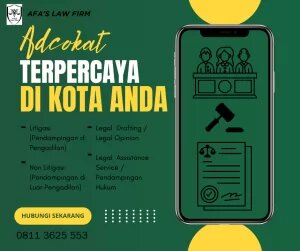Best Conveyancing Lawyers in Indonesia
Share your needs with us, get contacted by law firms.
Free. Takes 2 min.
Free Guide to Hiring a Real Estate Lawyer
Or refine your search by selecting a city:
List of the best lawyers in Indonesia
About Conveyancing Law in Indonesia
Conveyancing in Indonesia refers to the legal process of transferring the ownership of property or land from one party to another. This field of law covers the preparation, verification, and execution of documents necessary to complete property transactions. The Indonesian legal system is unique, with different regulations and procedures depending on the type of land, property status, and whether the parties involved are Indonesian or foreign nationals. Navigating these rules often requires specialized knowledge of Indonesian land law, administrative requirements, and government procedures.
Why You May Need a Lawyer
Conveyancing in Indonesia can be complex due to the nation’s intricate regulations on property ownership and land use. You may need a lawyer if you are:
- Buying or selling property for the first time in Indonesia
- A foreign national or foreign investor dealing with property transactions
- Dealing with inheritance or transfer of property within your family
- Entering into joint ventures or business arrangements involving land
- Facing disputes over property boundaries, land titles, or ownership claims
- Requiring verification of land titles and checking their authenticity
- Handling property in special areas like Bali or Jakarta with unique local law implications
- Seeking to understand the taxes and fees associated with property transfers
Local Laws Overview
Several key aspects of Indonesian law impact conveyancing:
- Land Ownership: Under the Basic Agrarian Law, only Indonesian citizens and certain legal entities can own land. Foreigners cannot directly own freehold land (Hak Milik), but may acquire usage rights (Hak Pakai) under specific conditions.
- Land Title Verification: Land titles must be properly registered at the National Land Agency (Badan Pertanahan Nasional, BPN). Titles may include freehold (Hak Milik), right to build (Hak Guna Bangunan), right to use (Hak Pakai), and leasehold (Hak Sewa).
- Legalization and Settlement: Property transactions typically require a Deed of Sale and Purchase (Akta Jual Beli) signed before a licensed Land Deed Official (Pejabat Pembuat Akta Tanah, PPAT).
- Taxes and Fees: Both buyers and sellers are subject to various taxes, such as Land and Building Acquisition Duty (BPHTB) and income tax (PPh) on the sale of property.
- Certificate of Clean and Clear: Ensuring the absence of encumbrances, disputes, or unofficial claims is crucial before finalizing a transaction.
- Foreign Investment Regulations: Companies with foreign capital (PMA companies) may own property under the right to build or right to use, subject to approval and ongoing compliance with investment laws.
Frequently Asked Questions
Can foreigners own land in Indonesia?
Foreigners cannot directly own freehold land in Indonesia. However, they may obtain land use rights (Hak Pakai) for residential purposes under certain conditions, or buy through Indonesian legal entities or by setting up a foreign investment company.
What types of land titles exist in Indonesia?
Indonesian land titles include freehold (Hak Milik), right to build (Hak Guna Bangunan), right to use (Hak Pakai), right to cultivate (Hak Guna Usaha), and leasehold (Hak Sewa). Each type has specific rules and limitations.
What is a PPAT, and what is their role?
A PPAT, or Land Deed Official, is a licensed professional responsible for preparing and witnessing legal documents relating to land transfers, such as the Deed of Sale and Purchase. The PPAT ensures the transaction is conducted in compliance with laws and registers the transfer with the land office.
What documents are required for a property sale?
You will usually need the land certificate, certificate of tax clearance, proof of payment of land and acquisition taxes, and personal identification documents for both parties. Additional documents may be required depending on the nature of the transaction.
How long does the conveyancing process take?
The process takes anywhere from a few weeks to several months, depending on government processing times, the complexity of the transaction, and whether all documentation is correct and complete.
Are there restrictions on selling property to foreigners?
Yes, strict rules limit property sales to foreigners. Foreigners can purchase a right to use but not freehold land. There are also price minimums and other residency requirements that must be met.
What taxes are involved in property transactions?
Parties must pay Land and Building Acquisition Duty (BPHTB), usually paid by the buyer, and income tax (PPh) on the sale, usually paid by the seller. There may also be local taxes and administrative fees.
How can I verify the authenticity of a land title?
A lawyer or land specialist can help verify the land title at the National Land Agency (BPN). They will ensure the certificate is genuine, up to date, and free from disputes or encumbrances.
What happens if there is a dispute over land ownership?
Disputes are common and may involve overlapping boundaries, double certificates, or inheritance issues. These usually require negotiation, mediation, or litigation in court. Lawyers are crucial in representing your interests and seeking resolution.
Can property be inherited in Indonesia?
Yes. Land can be inherited, typically through a formal inheritance process recognized by Indonesian law. Documentation must be presented to the land office, and taxes may apply. Legal guidance is recommended, especially for complicated family or citizenship situations.
Additional Resources
For more information and support regarding conveyancing in Indonesia, consider the following entities:
- National Land Agency (Badan Pertanahan Nasional, BPN): Handles land registration and title verification.
- Ministry of Agrarian Affairs and Spatial Planning: Regulates national land policy and agrarian reform.
- Perhimpunan Advokat Indonesia (PERADI): Indonesia’s Bar Association, for finding licensed lawyers.
- Local Notary Public and Land Deed Officials (PPAT): Assist with legal documentation and registration.
- Indonesian Investment Coordinating Board (BKPM): Resource for foreign investment rules and land ownership options.
Next Steps
If you need legal assistance with conveyancing in Indonesia:
- Gather all relevant information about the property, including titles, certificates, and identification documents.
- Consult a qualified Indonesian lawyer specializing in property law to assess your case and explain the process.
- Request due diligence and title checks for the property.
- Coordinate with a licensed PPAT for preparing and signing legal documents.
- Ensure all taxes and fees are calculated and paid promptly.
- Follow up at the National Land Agency (BPN) to ensure proper registration of your transaction.
- If you need to resolve property disputes or have complex legal questions, legal representation is strongly advised.
Lawzana helps you find the best lawyers and law firms in Indonesia through a curated and pre-screened list of qualified legal professionals. Our platform offers rankings and detailed profiles of attorneys and law firms, allowing you to compare based on practice areas, including Conveyancing, experience, and client feedback.
Each profile includes a description of the firm's areas of practice, client reviews, team members and partners, year of establishment, spoken languages, office locations, contact information, social media presence, and any published articles or resources. Most firms on our platform speak English and are experienced in both local and international legal matters.
Get a quote from top-rated law firms in Indonesia — quickly, securely, and without unnecessary hassle.
Disclaimer:
The information provided on this page is for general informational purposes only and does not constitute legal advice. While we strive to ensure the accuracy and relevance of the content, legal information may change over time, and interpretations of the law can vary. You should always consult with a qualified legal professional for advice specific to your situation.
We disclaim all liability for actions taken or not taken based on the content of this page. If you believe any information is incorrect or outdated, please contact us, and we will review and update it where appropriate.
Browse conveyancing law firms by city in Indonesia
Refine your search by selecting a city.

















